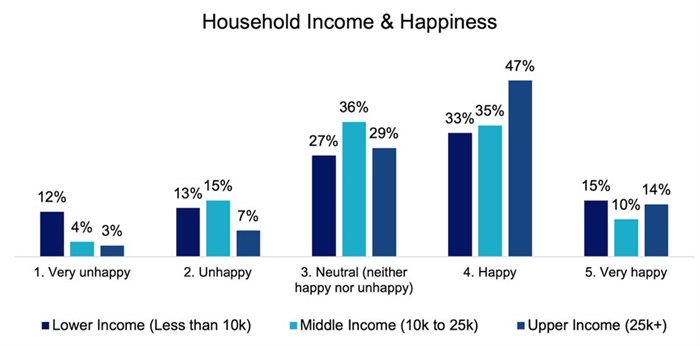
Can money buy happiness?
Can money buy happiness? Money is important to happiness; ask anyone who doesn’t have it. The recently released 2022 Bateleur Vantage Point survey explored many facets, including the concept of happiness.
South Africans answered the survey across various demographics and life stages. The results indicate that there is indeed a positive correlation between those who generally regard themselves as happy and those earning a higher income:

At a glance, the results in the accompanying graph make sense in that households with a higher income are generally happier than those struggling to get by. Having disposable income available allows households the freedom to cater to their primary day-to-day needs, financial and leisure needs, as well as the ability to take care of unexpected expenses. Naturally, households who are already struggling to meet their basic needs experience further hardships when unexpected expenses arise.
But what thoughts occupy the minds of low-income and higher-income households daily that create this ‘gap’ in happiness?
The survey results reveal that the things higher-income households fantasise about include being financially secure, travelling the world and desiring to live in a world where people can be kinder to each other. Contrastingly, the results reveal that the lower-income households fantasise about becoming wealthy, buying or building a home, buying a car, and finding their purpose and passion.
In addition, the survey reveals that the fears that occupy the minds of higher-income households include crime, loadshedding, corruption and political instability. Although these definitely are huge problems that plague our country, according to the results of the survey, lower-income families don’t share the same sentiments of concern; they worry about poverty and gender-based violence.
How does one begin to be happy when the fears that occupy your mind are centred around survival?
When we look at the relationship between fantasies and happiness, we see that the thoughts associated with a happier frame of mind are not thoughts centred around money or travelling the world. We find that irrespective of income, those who consider themselves as happy generally fantasise about giving back to others, mentoring and being an inspiration to others. These fantasies have a common theme – find happiness and purpose by helping others and not being self-serving.
These observations are not intended to make light of or diminish the financial struggles of many South Africans; instead, it highlights that self-serving materialism is not what creates happiness. It highlights that even through times of difficulty, we can find meaning, purpose, and joy in our lives.
If you enjoyed this article, signup below to receive more:-
